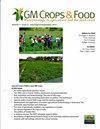转基因作物技术应用行为意向的先行因素建模
IF 4.5
2区 农林科学
Q1 BIOTECHNOLOGY & APPLIED MICROBIOLOGY
Gm Crops & Food-Biotechnology in Agriculture and the Food Chain
Pub Date : 2022-04-05
DOI:10.1080/21645698.2022.2057160
引用次数: 3
摘要
摘要本研究旨在研究转基因作物技术的行为意向。统计人口由伊朗圣战组织的所有专家组成(N=837)。样本量为310名农业专家,采用简单随机化方法。数据收集工具是一份调查表。通过结构方程建模对数据进行分析。研究结果提供了足够的证据来证实伦理关切对GMC技术行为意向的负面和显著影响,以及对技术态度和社会影响对行为意向的正面和显著影响。根据研究结果,有必要在国内外举办培训课程,采用自下而上的管理,使用有经验和前瞻性的管理者,在更大程度上让专家参与GMC的规划和发展,并在培训课程中分享个人经验,以改变人们的态度。本文章由计算机程序翻译,如有差异,请以英文原文为准。
Modeling antecedent factors involved in behavioral intention towards technology application of genetically modified crops
ABSTRACT This research aimed to study behavioral intention toward genetically modified crop (GMC) technology. The statistical population was composed of all staff experts of Jihad-e Agriculture Organization of Iran (N = 837). The sample size was 310 agricultural experts taken by simple randomization. The data collection tool was a questionnaire. Data were analyzed by structural equations modeling. The results provided enough evidence to confirm the negative and significant effect of ethical concerns on behavioral intention toward GMC technology and the positive and significant effect of attitude toward technology and social impact on behavioral intention. According to the results, it is necessary to hold training courses inside and outside the country, adopt bottom-up management, use experienced and prospective managers, involve experts in planning and development of GMCs to a greater extent, and share personal experiences in training courses to change people’ attitude.
求助全文
通过发布文献求助,成功后即可免费获取论文全文。
去求助
来源期刊

Gm Crops & Food-Biotechnology in Agriculture and the Food Chain
Biochemistry, Genetics and Molecular Biology-Biotechnology
CiteScore
8.10
自引率
10.30%
发文量
22
期刊介绍:
GM Crops & Food - Biotechnology in Agriculture and the Food Chain aims to publish high quality research papers, reviews, and commentaries on a wide range of topics involving genetically modified (GM) crops in agriculture and genetically modified food. The journal provides a platform for research papers addressing fundamental questions in the development, testing, and application of transgenic crops. The journal further covers topics relating to socio-economic issues, commercialization, trade and societal issues. GM Crops & Food aims to provide an international forum on all issues related to GM crops, especially toward meaningful communication between scientists and policy-makers.
GM Crops & Food will publish relevant and high-impact original research with a special focus on novelty-driven studies with the potential for application. The journal also publishes authoritative review articles on current research and policy initiatives, and commentary on broad perspectives regarding genetically modified crops. The journal serves a wide readership including scientists, breeders, and policy-makers, as well as a wider community of readers (educators, policy makers, scholars, science writers and students) interested in agriculture, medicine, biotechnology, investment, and technology transfer.
Topics covered include, but are not limited to:
• Production and analysis of transgenic crops
• Gene insertion studies
• Gene silencing
• Factors affecting gene expression
• Post-translational analysis
• Molecular farming
• Field trial analysis
• Commercialization of modified crops
• Safety and regulatory affairs
BIOLOGICAL SCIENCE AND TECHNOLOGY
• Biofuels
• Data from field trials
• Development of transformation technology
• Elimination of pollutants (Bioremediation)
• Gene silencing mechanisms
• Genome Editing
• Herbicide resistance
• Molecular farming
• Pest resistance
• Plant reproduction (e.g., male sterility, hybrid breeding, apomixis)
• Plants with altered composition
• Tolerance to abiotic stress
• Transgenesis in agriculture
• Biofortification and nutrients improvement
• Genomic, proteomic and bioinformatics methods used for developing GM cops
ECONOMIC, POLITICAL AND SOCIAL ISSUES
• Commercialization
• Consumer attitudes
• International bodies
• National and local government policies
• Public perception, intellectual property, education, (bio)ethical issues
• Regulation, environmental impact and containment
• Socio-economic impact
• Food safety and security
• Risk assessments
 求助内容:
求助内容: 应助结果提醒方式:
应助结果提醒方式:


